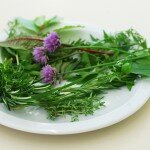 More people may be turning to herbal use but many haven’t fully acknowledged the power in herbs. Considering that many drugs are based on only one component of any one plant that often contains over 100 components, we can imagine the strength of the whole plant when used wisely. While it may sometimes take longer to see a plant’s effectiveness, it works in tandem with body function. The extra bonus is that medicinal herbs, sometimes termed phytotherapy, are not accompanied with the possibility of addiction as with some medical drugs.
More people may be turning to herbal use but many haven’t fully acknowledged the power in herbs. Considering that many drugs are based on only one component of any one plant that often contains over 100 components, we can imagine the strength of the whole plant when used wisely. While it may sometimes take longer to see a plant’s effectiveness, it works in tandem with body function. The extra bonus is that medicinal herbs, sometimes termed phytotherapy, are not accompanied with the possibility of addiction as with some medical drugs.
Why are herbs safer than drugs? - Our body recognizes and accepts herb components as natural substances with actions that work harmoniously with our body, like food. This contrasts the forcing action after chemical modifications that suppress body responses in the manner of drugs. Most herbs cross the blood brain barrier. This can be an asset for conditions that impair brain function, including Lyme disease, depression, anxiety and poor memory. Working with herbs for such conditions should be with the guidance of a skilled health practitioner or Master Herbalist because choosing the correct herb and right amount takes as much knowledge as choosing the right drug from a drug manual.
How to know which herb does what - It’s easy to look up herbal remedies online or ask someone in a health store, but matching a herb to your condition and interactions with either medications or natural remedies will take more knowledge or effective research as well as an understanding of physiology. This particularly comes into effect when you are working with a condition that threatens your health because you are then on a timeline for effective treatment and improvement.
When is it safe to turn to herbs? - Early onset of annoying symptoms will often find relief and systemic balance with herbal remedies and dietary adjustments. Simple examples include:
Indigestion - herbals teas like peppermint or spearmint are stimulants that promote release of digestive juices. Too determine if your digestive system is too acidic or too alkaline, drink one teaspoon of apple cider vinegar in a bit of water. Relief indicates you are too alkaline and need more acidic foods to help re-balance. Aggravation from the vinegar means you are already too acidic and would find relief with a more alkaline food intake, like baking soda on a short-term basis only, with re-balancing through cleansing and dietary changes. Herbal tea is a healthy addition to everyone’s diet, including chamomile, green tea, peppermint, spearmint and fruit teas.
Constipation - Triphala is a three-herb remedy, the most popular Ayurvedic herbal formula in India that nourishes the body, helps colon peristalsis and provides an internal cleansing action.
Excluding water and fiber intake – in that order, with both usually implicated in chronic constipation… some helpful herbal teas for constipation include any combination of peppermint, licorice, cascara sagrada, senna, dandelion, fennel or burdock. Colon cleansing herbal blends are found at health food stores, combining herbs like corn silk, red clover, slippery elm, yellow dock, cloves, blessed thistle, or plantain and mixed fibers like psyllium husk, fruit pectin, Irish moss, alginate or bran fiber. Periodic use ensures a healthier colon. Addition of flaxseed oil or hemp oil to your daily diet is another important item and aloe vera is a food well-known for its action of balancing colon function.
Insomnia - some of the best results are obtained from a detoxification program to improve nerve health, but temporary relief may result from herbal teas or the stronger form of a liquid herbal tincture. Selections include the relaxing effect of lavender, chamomile, catnip, passionflower, or St. John’s Wort (reported to nullify effectiveness of birth control pills). All chamomiles provide some relaxation response, but Roman Chamomile (Anthemis Nobilis) is the most effective chamomile for insomnia relief. While safe enough for children, chamomile should be avoided by those with allergies to the daisy family.
Valerian root is an effective insomnia aid but may result in too heavy a sleep and sedated feeling for some. It does not, however, compare to the heavy drugged aftermath and addiction of sleeping pills.
Drugs and Surgery - While supporting herbal use, it is important to recognize the benefit of drug intervention in advanced cases of ill health and pain, as well as surgical success with severe conditions of aneurysm, cardiac failure and similar life-threatening circumstances.
There is much we can do, however, with lifestyle changes and natural options to avoid reaching advanced states of dysfunction.



